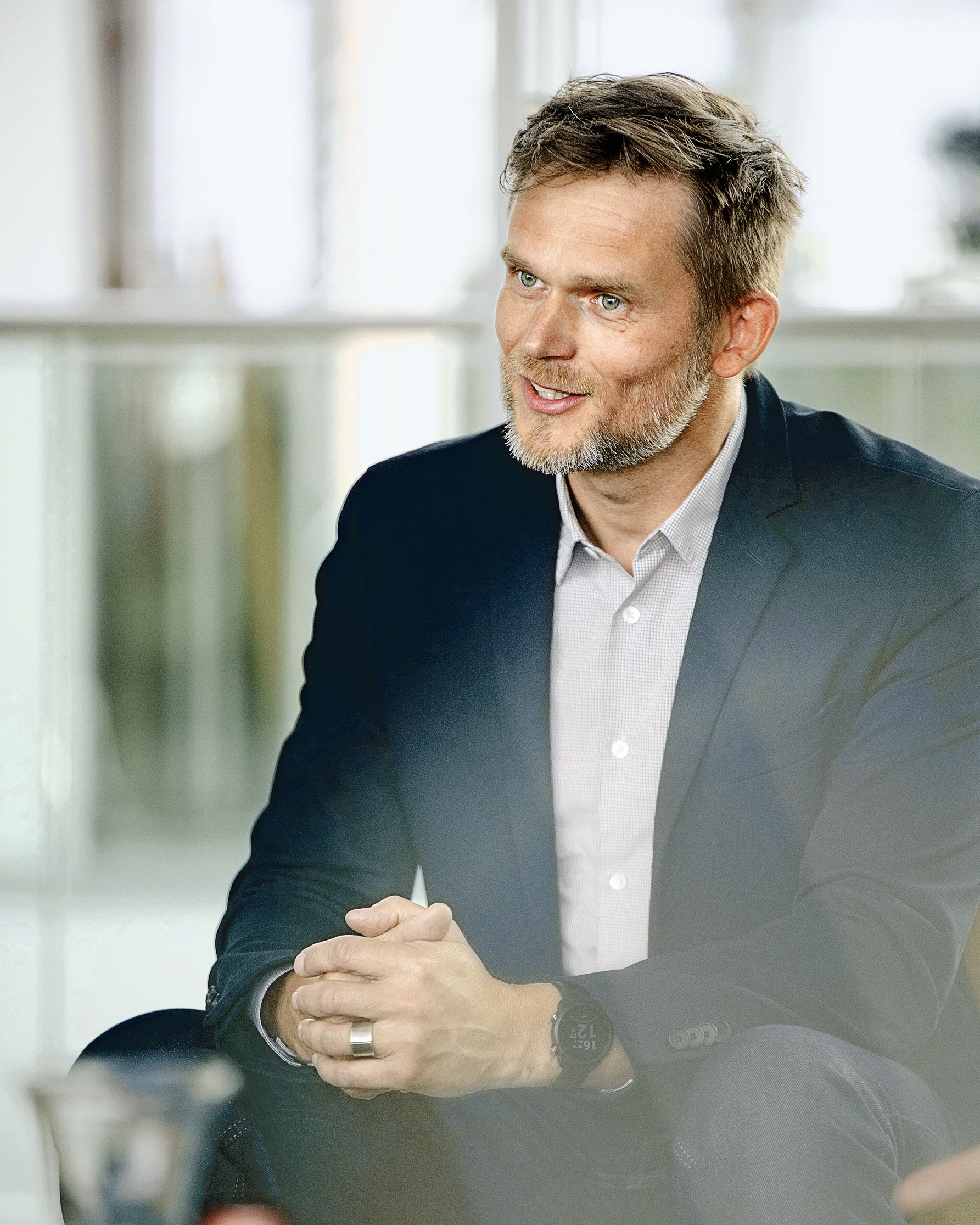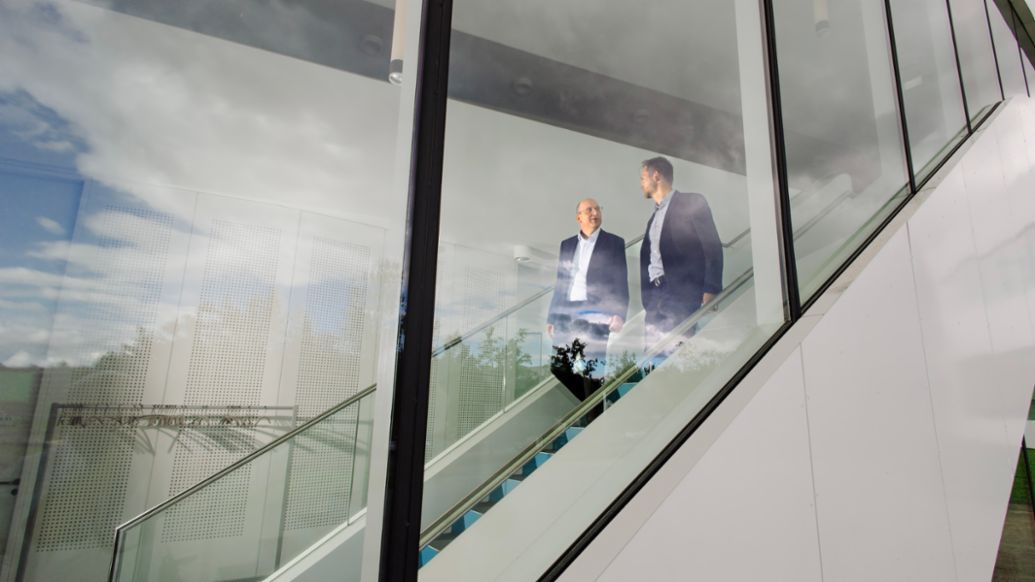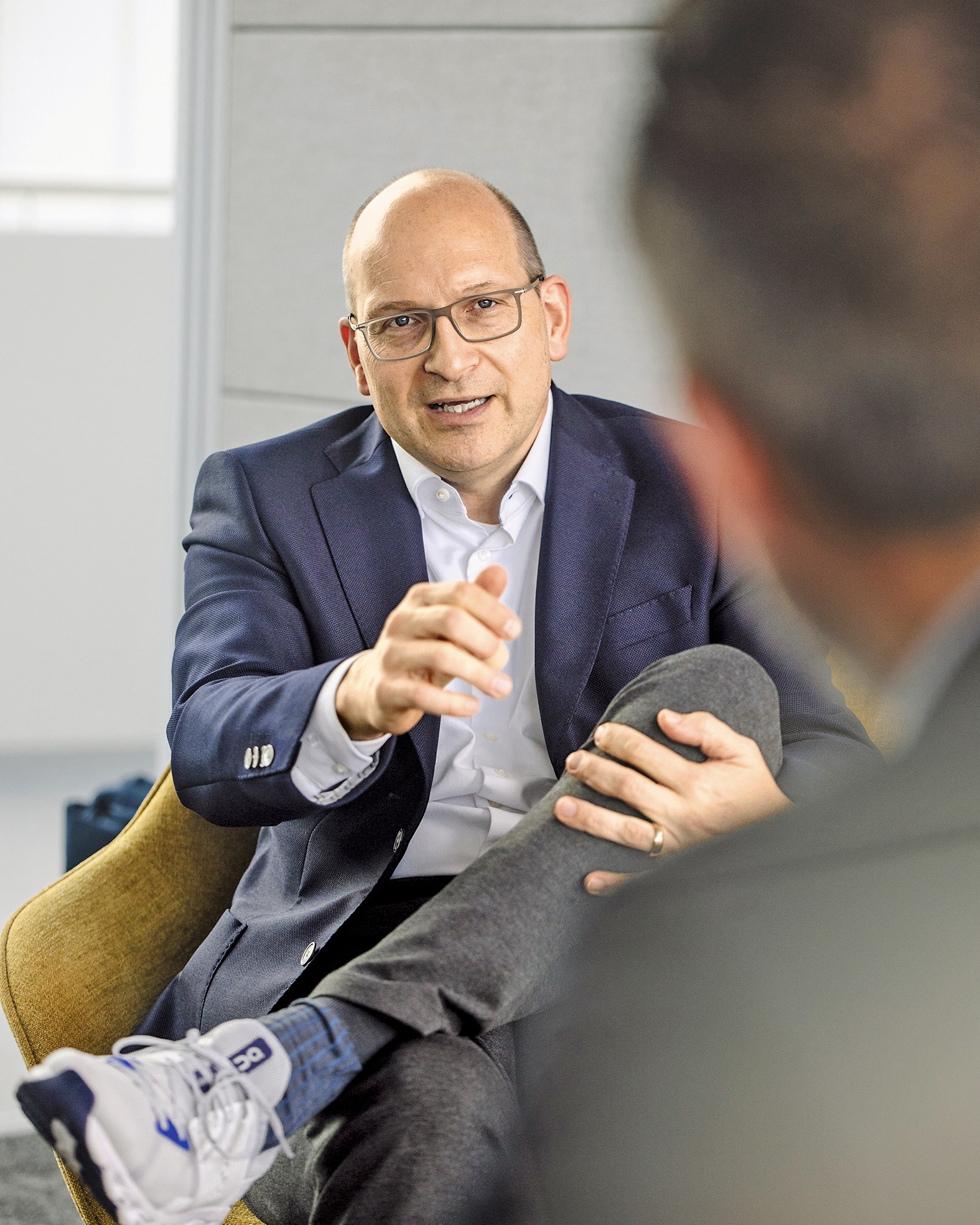There is currently a lot of hype about artificial intelligence. Will the technology really bring about the fundamental changes in society and industry that are expected? Much like the emergence of the internet at the turn of the millennium?
Dr. Matthias Peissner: There is definitely some hype in the media. The first push came in autumn 2022 with ChatGPT, and more hype—and disappointment— is likely to follow. In the long term, however, the path ahead is clearly laid out: Artificial Intelligence (AI) will reach a level that was unimaginable until recently. Look at how many products of human intelligence surround us. And now imagine that all of these things will be based on artificial intelligence that is equal to, or in some cases even superior to, human intelligence in the future. This will bring massive changes. We are definitely at a major threshold.
Markus-Christian Eberl: In my view, the comparison with the emergence of the internet at the turn of the millennium does not go far enough. If you look at the history of technology, a significant part of industrial development over the last 2,000 years has taken place—figuratively speaking—below the neck. Innovations from hydropower to steam engines and fully automated production were essentially aimed at ‘mechanizing’ human muscle strength and skill. If the part above the neck, that is, intelligence, is now ‘mechanized’, big changes can be expected—in companies and in society as a whole.

So we are facing the industrialization of thinking?
Peissner: Increased economic efficiency and quality are certainly very central areas of impact for the use of AI. In addition, AI could also help us to make complex issues manageable. Perhaps this will help us to deal with the major economic problems of our time—shortage of skilled workers, scarcity of energy and resources, and sustainability.
Eberl: It’s a very bold summary, but you could put it that way. The magnitude of the impending changes can by all means be compared with the industrial revolution. In companies, AI works in multiple directions: It makes processes more efficient, which increases speed and provides cost benefits. At the same time, we can increase the performance and effectiveness of our products, for example in the form of new, innovative features or an improvement in product quality. We can therefore be faster, more economical, and better with AI.
How is Porsche Engineering already using AI?
Eberl: One of many examples is the use of AI in the validation process for automated driving functions. These systems must react reliably not only in standard situations, but also in special traffic situations. Imagine, for example, a richly decorated cow walking on the road during the cattle drive down from the Alpine pastures. Although this is an exceptional traffic disturbance, the system must reliably detect the animal. Numerous vehicles travel many kilometers every day in order to collect as much ‘visual material’ as possible to secure the automated driving functions in a wide variety of situations. In doing so, the identification of the rare cases in the sensor and video data of the trips, such as the cow from the cattle drive, resembles a search for a needle in the haystack. Under certain circumstances, only 0.0001 percent of a recording is relevant. That is why we have trained an AI to identify and extract what are known as corner cases—and thereby greatly increase efficiency in the development and validation process. Another practical example for the application of AI is large language models, which we are already using in software development, for example to increase the efficiency of the software coding. If I describe a problem sufficiently well, a well-trained LLM can generate the corresponding code at development level 1 very efficiently. This means that the coding of a function, which used to be done by experts, is now done by AI machines at a high level. The further optimization and integration steps for this code are still mainly the task of experts, although the AI capabilities in this area are developing rapidly.
“The magnitude of the impending changes can by all means be compared with the industrial revolution.” Markus-Christian Eberl, CEO of Porsche Engineering
An LLM may give a slightly different response every day. How does this work with classical engineering, where reliability and precision are important?
Eberl: A rethinking is indeed needed here. Until now, engineering studies have been designed to learn scientific principles and to be able to apply them to technical problems. The electronic procedures used in everyday engineering were also based primarily on mathematical and empirical methods, which could be carried out independently and unambiguously by the expert, or at least be reproduced, with sufficient effort. AI is now introducing a completely new methodology based on training with large data sets. This fundamental difference should be taken into account both in the overall validation strategy and in the approval based on it, because even if the engineer can no longer fully understand every step, the reliability of the final result must be guaranteed. Approaches such as ‘explainable AI’ aim to ensure that the results of AI remain comprehensible in terms of content. Other validation methods combine classic and AI-based methods.

Peissner: Machine learning represents the major paradigm shift. How these systems come to their conclusions is initially unclear. In this respect, the saying used in aviation, ‘If you no longer understand what the system does, turn it off’, no longer applies. But we can also gain new insights through this new way of working. In medicine, for example, a procedure has long been used that recognizes and classifies different types of skin cancer. From such a system, new indicators for good human decisions can also be derived.
Does the engineer of tomorrow have to master the deterministic models at all?
Peissner: Of course, otherwise we will be completely at the mercy of AI! Someone needs to check whether the results provided by AI are valid. Moreover, the way to the result is also sometimes important. For example, when I do some research on the internet, I often stumble upon articles that I might just scan through. But in doing so, I learn new things and expand my horizons. When I do the research with ChatGPT, in contrast, I get a result that I can use immediately, but I don’t have this process of seeing what’s going on to the right and left of my view. But that is exactly what many innovations are based on.
Eberl: In addition, AI relieves the human brain of simpler tasks, such as processing data. This gives ou time for more creative tasks. You use AI as a tool and don’t see it as a competitor.
How can companies prepare their workforce for this new way of working?
Eberl: The goal should be the ‘democratization of AI’: The topic must be taken to every corner of the company so that everyone sees and seizes the opportunities offered by the new technology. Because the subject is so important to us, we have established a dedicated unit for Big Data and AI at Porsche Engineering. This is our nucleus. But for a successful ‘democratization of AI’, a larger change management approach is needed. We must also demonstrate pragmatic solutions and promote flagship projects that show the positive aspects of the new methods. If we succeed, the topic will have its own momentum. You need the centralized ‘push’—plus the ‘pull’ from all parts of the organization.
So far, Europe has only achieved one pioneering feat in the field of AI: With the AI Act, we were the first to regulate technology. Where is Europe in the global AI race?
Eberl: AI is dealt with differently in different regions of the world: In Europe, we tend to have a more risk-oriented view. We try to anticipate and avoid problems. In other parts of the world, an opportunity-oriented view dominates. It is in the nature of the matter that certain developments are carried out faster there. For us as a company, it is important that we know the local differences in research and development, application and regulation of AI through our presence in all regions of the world. We have gained a comprehensive view of AI in the world and can offer our customers tailor-made solutions.
Peissner: In general, I think we in Germany should concentrate more on our strengths! We are well positioned in research, and a good deal of funding has been well spent through the federal government’s AI strategy. What we lack compared to the US is private investment. That is why we are not competitive when it comes to developing large language models. But perhaps that is not necessary either. AI is, after all, an all-purpose technology—basically like electricity. It is not about who invents it, but who uses it quickly and efficiently. We haven’t lost the race yet. We need to completely rethink the processes, particularly with the help of employees. This tradition of co-creation is a strength that we take too little advantage of in Germany.

Technology circles are already talking about Artificial General Intelligence (AGI), a generalist AI that is superior to humans. Is such a technology coming in the long term?
Eberl: For example, if you had asked Volta or Edison what makes electricity possible today, they would probably not have predicted our modern reality very well. Forecasting over such long periods is difficult. I think it is currently relevant to understand the importance of the technology and to establish adequate change management. Humans generally tend to think about developments in a linear way. But the new AI technology— once it has gained a foothold—will open up entirely new possibilities and have exponential effects. Predicting them should be more of a task for the philosophers.
Peissner: I really believe that in the future we will have artificial intelligence that is superior to humans in some respects. Perhaps this will even happen this decade. But the question will be: Can 90 percent of the population still understand this progress—or will AI become a topic for a small elite? I think that this is an important task for the future: We must ensure that technology serves everyone.
Info
Text first published in the Porsche Engineering Magazine, issue 2/2024.
Text: Constantin Gillies
Photos: NÓI CREW
Copyright: All images, videos and audio files published in this article are subject to copyright. Reproduction in whole or in part is not permitted without the written consent of Dr. Ing. h.c. F. Porsche AG. Please contact newsroom@porsche.com for further information.


